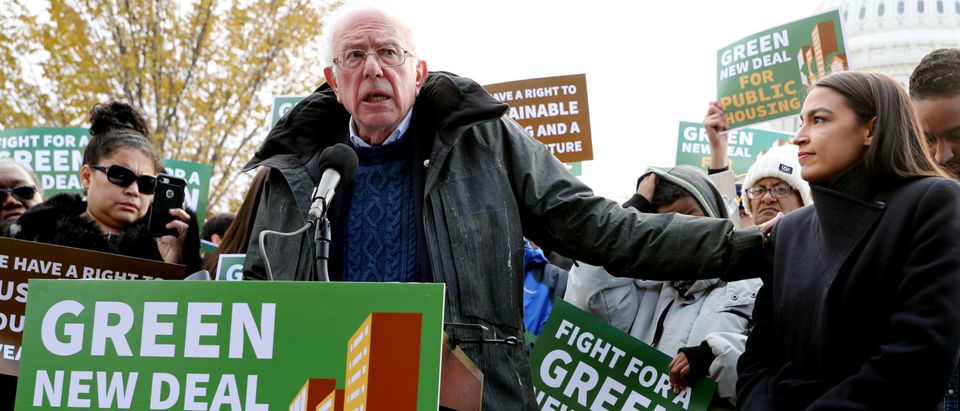Thanks to the incompetence of the Iowa Democratic Party, we may never know who won the Iowa Caucus, but we do know that Vermont Senator Bernie Sanders was at the top of the pack. In fact, the latest national poll showed Sanders leading the Democratic presidential field going into Tuesday night’s New Hampshire primary.
It’s little surprise then that Sanders emerged victorious from New Hampshire. As the 78-year-old independent has picked up momentum, the rest of the Democratic primary field has fallen into sniping amongst themselves, seemingly unable to stop the self-avowed socialist.
Joe Biden isn’t the only one who stands to lose should Sanders capture the nomination. Sanders’ collectivist policies would do real and lasting harm to America’s economy. Nowhere is that more evident than in his approach to energy production and climate change.
Sanders touts his version of the Green New Deal as an opportunity to make American society more equitable, but it isn’t easy to see who wins under a plan that calls for 100 percent renewable energy use in electricity and transportation within a decade.
Increasing the use of wind and solar energy is a laudable goal, but even if we doubled the amount of renewable energy we use today it would still account for less than 40 percent of electricity generation. Eliminating petroleum from the transportation sector, which currently provides 92 percent of the sector’s energy use, is an even bigger hurdle.
But Sanders is nothing if not earnest, and he’s serious about ending oil and natural gas production and putting nearly 10 million people out of work within a decade. To put that in perspective, that’s more job destruction than the 8.8 million positions lost at the height of the Great Recession.
That may not make New Englanders nervous since the region is accustomed to paying high energy prices and importing liquified natural gas from Russia, but it scares the bejeebers out of the rest of the country.
Sanders understands that it wouldn’t be right to chuck these workers, many of whom are union members, out on the street, so his Green New Deal includes a generous government offer to pay full salary and benefits for five years at the expense of taxpayers. There’s also the promise of job retraining to turn today’s frackers into tomorrow’s coders.
Is it any wonder that labor unions overwhelmingly oppose the Green New Deal?
The price tag for all this government spending adds up to $16.3 trillion dollars. Sanders waves off concerns about running out of other people’s money, arguing the project will pay for itself within 15 years.
This is where things get truly wacky.
For Sanders not only wants to eliminate an entire sector of the economy, he expects it to pay for its past “pollution through litigation, fees, and taxes.” A neat trick, getting the oil and gas industry to pay taxes after its dead and buried.
Most Americans support reasonable action to reduce the effects of climate change, but they also list affordable energy and economic growth as top priorities – two things that seem incompatible with Sanders’ plan.
But, as Sanders explains on his website, we shouldn’t bother ourselves with the cost of energy under the Green New Deal because the “regional Power Marketing Authorities” will make electricity “virtually free, aside from operations and maintenance costs” after 2035.
Sanders doesn’t explain who the PMA are or where all this free energy will come from. Instead, he paints a picture of the future that sounds a lot like the anti-automobile dystopia of the Rush song “Red Barchetta.”
The Green New Deal isn’t just bad for the economy, it’s bad for the environment as well. The number one reason that U.S. greenhouse gas emissions have been declining in recent years is because of utilities have been switching from coal to cleaner-burning natural gas to generate electricity. Shutting down America’s booming oil and gas sector would be like killing the goose that laid the golden egg.
Sanders’ win last night in New Hampshire should serve as a warning bell for voters. As the Democratic primary contest moves south, there’s still time for voters to correct course and support a candidate who understands the value of the free market and private investment.
New Hampshire Democrats may have given Bernie Sanders and his Green New Deal some early momentum. We can only hope that by the time their nominating contest is over, Democrats will have come to their senses and chosen a candidate with main street appeal. Otherwise we may all be importing LNG from Russia.
Dan K. Eberhart is CEO of Canary, an independent oilfield services company in the United States, and a frequent commentator on US politics.


